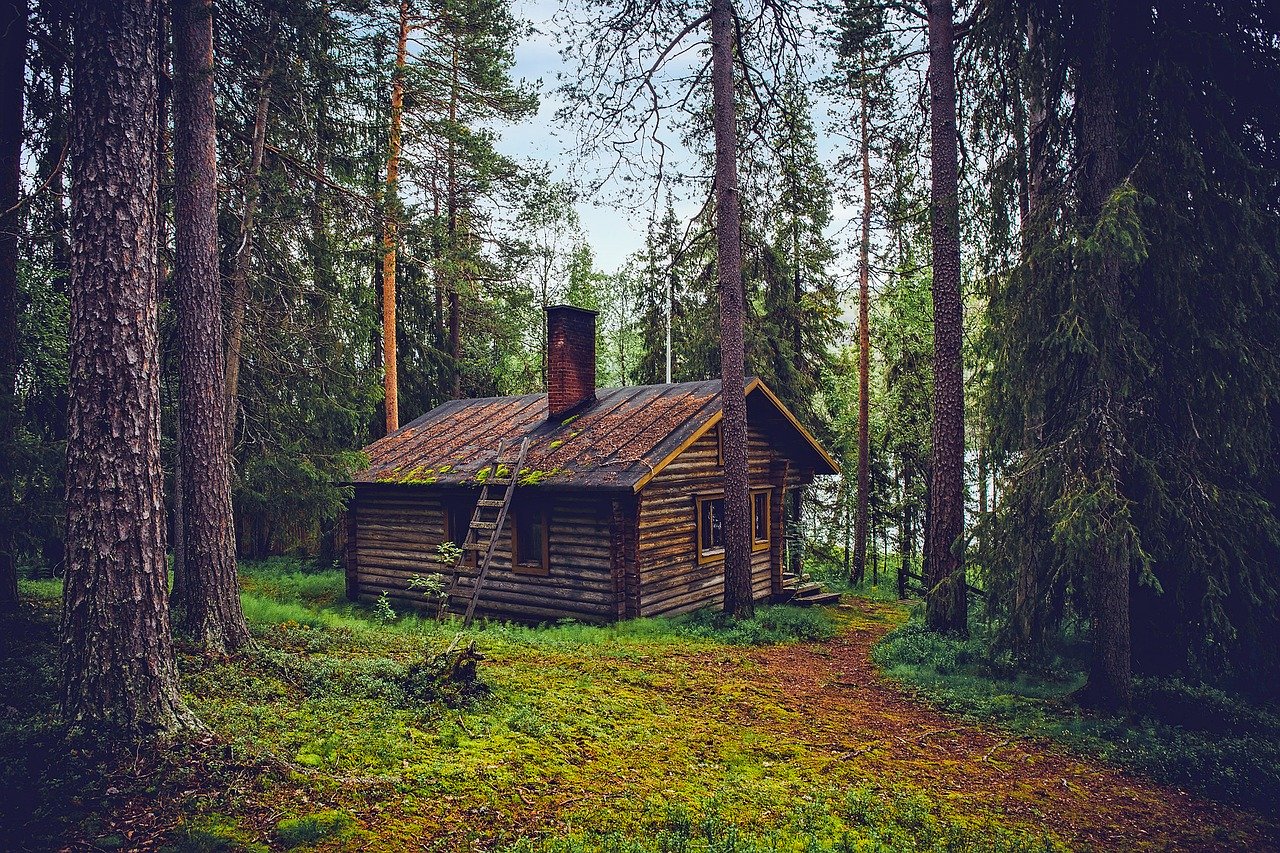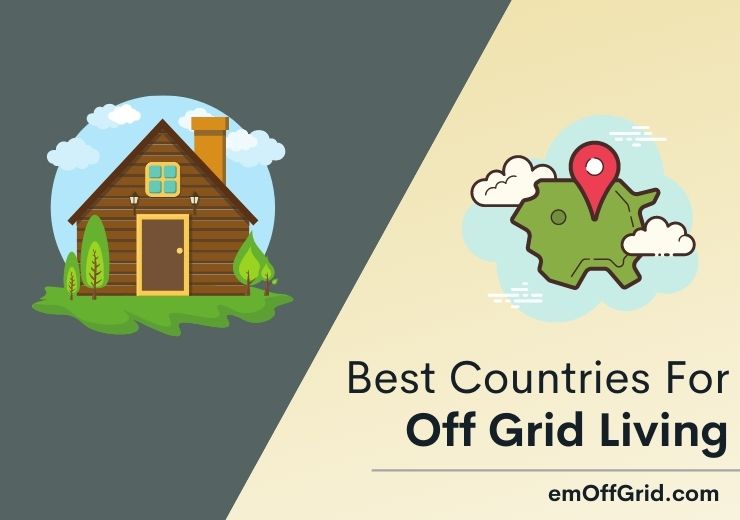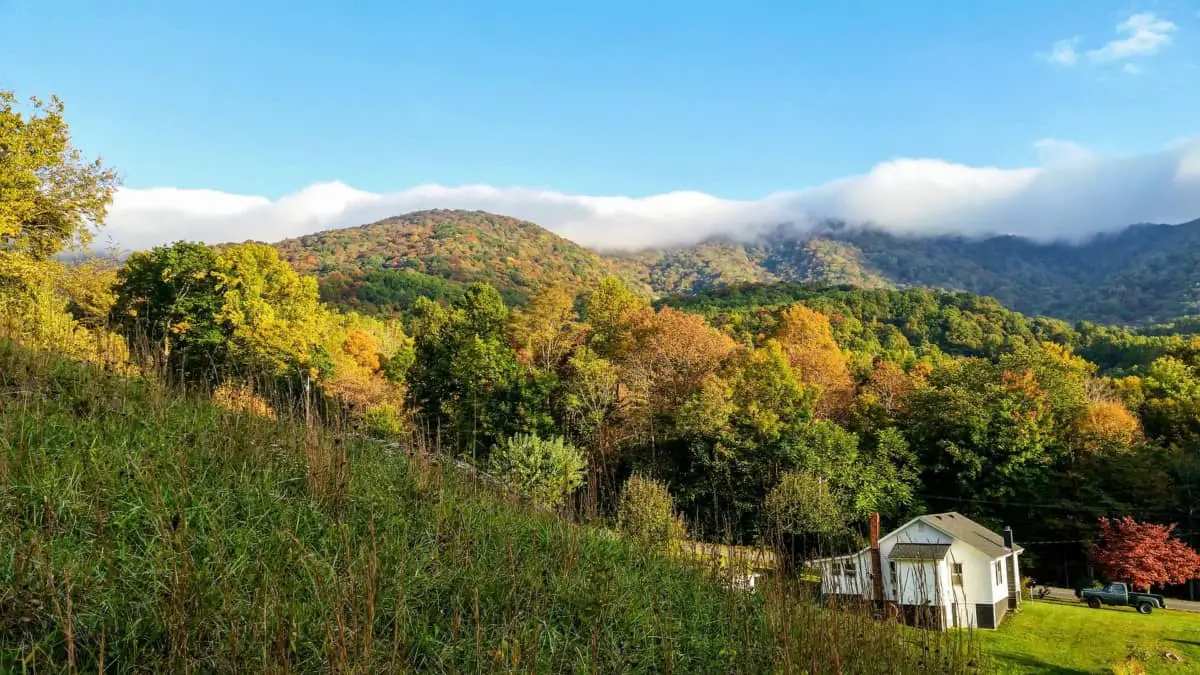Best country to live off the grid – Embark on an extraordinary journey as we explore the best countries to live off the grid, where self-sufficiency, tranquility, and connection with nature intertwine. Discover the ideal climates, abundant resources, and supportive communities that make these destinations havens for those seeking a life beyond the constraints of modern society.
From the sun-kissed shores of Costa Rica to the rugged wilderness of Alaska, we’ll delve into the unique characteristics of each country, providing invaluable insights for those considering an off-grid lifestyle.
Factors to Consider for Living Off the Grid
Choosing a country to live off the grid requires careful consideration of various factors that impact self-sufficiency and independence. These factors include climate, land availability, infrastructure, and legal regulations.
Climate:Favorable weather conditions are crucial for off-grid living. Countries with mild temperatures, abundant sunshine, and reliable rainfall provide ideal environments for growing food, generating renewable energy, and collecting rainwater. Consider countries like Costa Rica, Portugal, or Spain for their temperate climates.
Land Availability
Access to affordable and suitable land is essential. Look for countries with ample undeveloped land, reasonable land prices, and supportive land laws. Countries like Paraguay, Bolivia, and Panama offer vast tracts of land at relatively low costs.
Infrastructure
While living off the grid implies a degree of self-reliance, access to basic infrastructure can enhance quality of life. Consider countries with reliable transportation networks, stable electricity grids (for occasional use), and accessible healthcare facilities. Uruguay, Chile, and Argentina offer a balance between remoteness and essential infrastructure.
Legal Regulations
Legal frameworks vary significantly regarding off-grid living. Some countries have strict regulations, while others offer more freedom. Research countries with supportive laws for off-grid living, including building codes, water rights, and property ownership. Consider Ecuador, Mexico, or Belize for their relatively liberal regulations.
Natural Resources and Climate

Living off the grid necessitates access to abundant natural resources and a favorable climate. Ideal conditions include:
- Temperature:Moderate temperatures, with mild winters and warm summers, reduce the need for heating and cooling.
- Precipitation:Ample rainfall or snowfall provides water for drinking, sanitation, and irrigation.
- Access to water:Natural springs, rivers, or lakes ensure a reliable water source.
Climate and Natural Resource Availability in Different Countries
| Country | Climate | Natural Resources |
|---|---|---|
| Costa Rica | Tropical, with a dry and wet season | Abundant rainfall, tropical forests, fertile soil |
| New Zealand | Temperate, with mild winters and warm summers | Plentiful rainfall, geothermal energy, forests |
| Canada | Vast, with varying climates | Extensive forests, freshwater lakes, mineral deposits |
Challenges of Living in Extreme or Remote Environments
Living in extreme or remote environments poses challenges:
- Extreme temperatures:Cold or hot climates require specialized housing and heating/cooling systems.
- Limited water access:Arid regions or high altitudes may lack sufficient water sources.
- Harsh terrain:Mountainous or forested areas can make transportation and resource extraction difficult.
Land Ownership and Availability
Land ownership laws and regulations vary significantly across countries. In some countries, foreigners are restricted from owning land, while in others, they may be able to acquire land under certain conditions. It is important to research the land ownership laws of the country you are considering before making a decision.
Acquiring Land
The process of acquiring land can also vary from country to country. In some cases, you may be able to purchase land directly from the government, while in others, you may need to go through a private seller. It is important to understand the process involved in acquiring land in the country you are considering.
Restrictions on Foreigners
In some countries, there are restrictions on foreigners owning land. These restrictions may vary from country to country. In some cases, foreigners may only be able to own land in certain areas or for certain purposes. It is important to research the restrictions on foreigners owning land in the country you are considering.
Advantages and Disadvantages of Owning Land, Best country to live off the grid
There are both advantages and disadvantages to owning land. Some of the advantages of owning land include:* You have complete control over your property.
- You can build or improve your property as you see fit.
- You can sell or rent your property for profit.
Some of the disadvantages of owning land include:* Land can be expensive to purchase and maintain.
- You are responsible for paying property taxes and insurance.
- You may have to deal with zoning restrictions and other regulations.
Advantages and Disadvantages of Leasing or Renting
There are also advantages and disadvantages to leasing or renting land. Some of the advantages of leasing or renting land include:* It is typically less expensive than purchasing land.
- You do not have to pay property taxes or insurance.
- You have more flexibility to move if you need to.
Some of the disadvantages of leasing or renting land include:* You do not have complete control over your property.
- You may not be able to make changes to the property without the landlord’s permission.
- You may have to pay rent increases over time.
Infrastructure and Connectivity
Infrastructure and connectivity play a crucial role in off-grid living, ensuring access to essential services and resources. Transportation networks enable movement of goods and people, communication systems facilitate information exchange, and utilities provide vital services like electricity and water.Limited or absent infrastructure poses significant challenges.
Transportation can become difficult, especially during emergencies. Communication may be unreliable or unavailable, hindering access to information and support. Utilities might not be accessible, requiring alternative energy sources and water purification systems.
Infrastructure and Connectivity Levels
The table below compares infrastructure and connectivity levels in different countries:| Country | Transportation | Communication | Utilities ||—|—|—|—|| Canada | Excellent | Good | Good || United States | Excellent | Good | Good || Australia | Good | Good | Good || Mexico | Fair | Fair | Fair || Brazil | Poor | Poor | Poor |
Cost of Living and Economic Stability
The cost of living and economic stability are crucial factors to consider when choosing a country to live off the grid. The cost of food, housing, healthcare, and transportation can vary significantly between countries, and it’s essential to ensure that you have a sustainable financial plan in place.
Economic Stability
Economic stability refers to the ability of a country to maintain a stable and growing economy. Factors such as inflation, unemployment rates, and political stability all contribute to economic stability. A stable economy is essential for ensuring that you have access to essential goods and services and that your investments are protected.
Cost of Living
The cost of living refers to the amount of money required to maintain a certain standard of living in a particular location. This includes expenses such as food, housing, healthcare, transportation, and education. The cost of living can vary significantly between countries, and it’s important to research and compare the costs in different locations before making a decision.
Financial Planning
Financial planning is essential for living off the grid. You will need to have a reliable source of income and a budget that allows you to cover your expenses. It’s also important to have an emergency fund in place to cover unexpected costs.
Self-Reliance
Self-reliance is another important factor to consider when living off the grid. You will need to be able to provide for your own needs, such as food, water, and shelter. This may involve learning new skills, such as gardening, hunting, or building.
Community and Support

For individuals living off the grid, having access to a supportive community is of paramount importance. In remote areas, where resources and services may be scarce, a sense of community fosters resilience and provides essential support systems. This includes access to healthcare, education, and social services, which can be crucial for the well-being and safety of off-grid residents.
Countries like Costa Rica and Panama have established thriving off-grid communities, where residents benefit from strong support networks. These communities often organize communal activities, share resources, and provide assistance to one another in times of need. Additionally, many off-grid communities have established their own healthcare and education systems, ensuring that residents have access to essential services.
Challenges of Living in Isolated Areas
While living off the grid can offer a sense of independence and self-sufficiency, it also comes with challenges, particularly in isolated or sparsely populated areas. One of the main challenges is the lack of access to healthcare and emergency services.
In case of a medical emergency, off-grid residents may have to travel long distances to seek medical attention, which can be both time-consuming and costly.
Another challenge is the lack of educational opportunities. In remote areas, schools may be few and far between, making it difficult for children to access quality education. This can limit their future prospects and hinder their ability to fully participate in society.
Legal and Regulatory Considerations: Best Country To Live Off The Grid
Living off the grid involves navigating a complex web of legal and regulatory frameworks. Understanding these frameworks is crucial for ensuring compliance and avoiding potential conflicts.
Building Codes and Environmental Regulations
Building codes and environmental regulations vary significantly across jurisdictions. Off-grid properties often require specialized construction techniques and materials to meet local standards. Additionally, environmental regulations may impose restrictions on land use, water usage, and waste disposal.
Taxation
Off-grid properties may be subject to different tax laws compared to traditional homes. In some cases, property taxes may be lower due to the lack of access to certain amenities. However, off-grid residents may also face additional taxes, such as generator or solar panel fees.
Importance of Compliance
Complying with local laws and regulations is essential for off-grid living. Failure to comply can result in fines, legal action, or even eviction. It is important to research and understand the specific legal and regulatory requirements in the area where you plan to live off the grid.
Safety and Security
Living off the grid poses unique safety and security considerations that require careful assessment and planning. Understanding the crime rates, political stability, and potential for natural disasters is crucial.
Crime Rates
The crime rate in a region significantly impacts the safety and security of living off the grid. It is essential to research the crime statistics of potential locations, including property crimes, violent crimes, and drug-related offenses. Consider the frequency of these crimes and the likelihood of becoming a victim.
Political Stability
Political stability is another vital factor to consider. Unstable political environments can lead to civil unrest, violence, and a breakdown of law and order. Assess the political climate of potential locations, monitor current events, and stay informed about any potential threats or instability.
Natural Disasters
Natural disasters such as hurricanes, earthquakes, and floods can pose significant safety risks. Evaluate the frequency and severity of natural disasters in potential locations. Determine the likelihood of experiencing these events and develop plans for evacuation, emergency preparedness, and disaster recovery.
Self-Protection and Community Preparedness
Living off the grid often involves a degree of self-reliance. It is essential to have basic self-protection skills, such as firearm safety, first aid, and self-defense. Building a strong community and establishing neighborhood watch programs can enhance safety and security.
Health and Well-being
Living off the grid poses unique health and well-being challenges due to limited access to healthcare, nutrition, and sanitation. Understanding these challenges is crucial for individuals considering this lifestyle.
Healthcare access in remote areas is often limited, with healthcare facilities and medical professionals scarce. This can make it difficult to receive timely and adequate medical care, especially in emergency situations. Additionally, the cost of healthcare can be a significant concern, particularly for those without health insurance.
Nutrition
Maintaining a healthy diet off the grid can be challenging due to limited access to fresh produce, dairy products, and other essential food groups. Individuals must rely on local resources and develop strategies for food preservation and storage to ensure adequate nutrition.
Sanitation
Access to clean water and proper sanitation is essential for health and well-being. Off-grid living requires individuals to establish their own water and sanitation systems, which can be complex and costly. Maintaining these systems is crucial to prevent water contamination and disease outbreaks.
| Country | Healthcare System | Life Expectancy | Infant Mortality Rate |
|---|---|---|---|
| United States | Private and public insurance-based | 78.8 years | 5.6 deaths per 1,000 live births |
| Canada | Universal healthcare | 82.9 years | 4.3 deaths per 1,000 live births |
| Australia | Universal healthcare with private insurance option | 82.5 years | 4.2 deaths per 1,000 live births |
| Costa Rica | Universal healthcare | 82.9 years | 8.7 deaths per 1,000 live births |
| Cuba | Universal healthcare | 78.4 years | 4.2 deaths per 1,000 live births |
Case Studies and Success Stories

Living off the grid can be a challenging but rewarding experience. Many individuals and communities have successfully embraced this lifestyle, demonstrating the viability of sustainable living. These case studies provide valuable insights into the challenges and strategies involved, offering lessons for aspiring off-grid enthusiasts.
By examining the experiences of others, we can learn from their successes and failures, gaining practical knowledge and inspiration. These case studies showcase diverse approaches to off-grid living, highlighting the adaptability and resilience of those who have chosen this path.
Challenges and Strategies
Off-grid living often presents unique challenges, such as securing reliable energy sources, managing water resources, and establishing sustainable food production systems. Case studies reveal the strategies employed by successful off-grid communities to overcome these obstacles.
- Harnessing renewable energy sources (e.g., solar, wind, hydro)
- Implementing water conservation techniques (e.g., rainwater harvesting, greywater systems)
- Establishing permaculture gardens and raising livestock for food
Lessons Learned
Case studies offer valuable lessons for those considering an off-grid lifestyle. They emphasize the importance of:
- Thorough planning and research
- Developing practical skills (e.g., building, gardening, energy management)
- Building a supportive community or network
- Adapting to changing circumstances and unforeseen challenges
Ultimate Conclusion
Whether you’re seeking a secluded retreat or a vibrant off-grid community, our comprehensive guide empowers you to make informed decisions about your off-grid adventure. Embrace the freedom, sustainability, and fulfillment that awaits in these exceptional destinations.
Questions and Answers
What factors should I consider when choosing a country for off-grid living?
Climate, land availability, infrastructure, legal regulations, and community support are crucial factors to evaluate.
Which countries offer the best climate and natural resources for off-grid living?
Costa Rica, Panama, and Belize boast favorable climates, abundant water sources, and diverse ecosystems.
How can I ensure legal compliance when living off the grid?
Research local building codes, environmental regulations, and taxation laws to avoid potential issues.
What are the challenges of living in remote areas with limited infrastructure?
Access to transportation, communication, and utilities can be limited, requiring self-reliance and alternative solutions.
